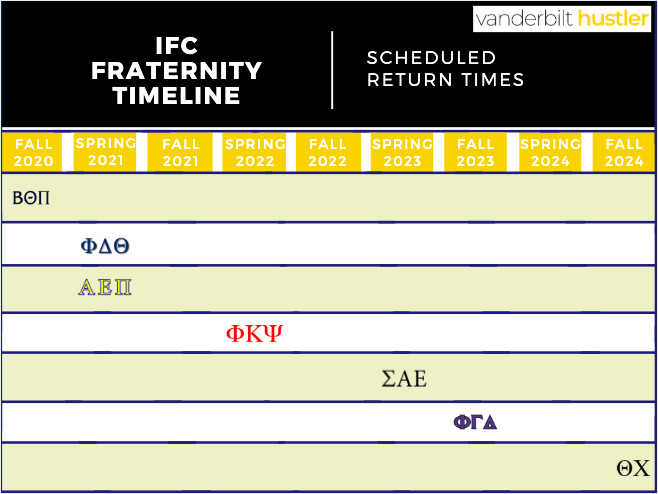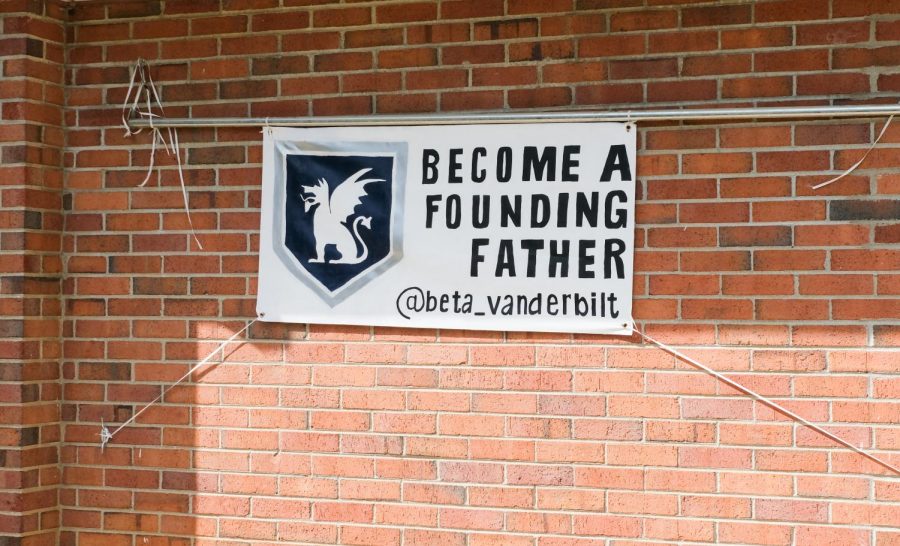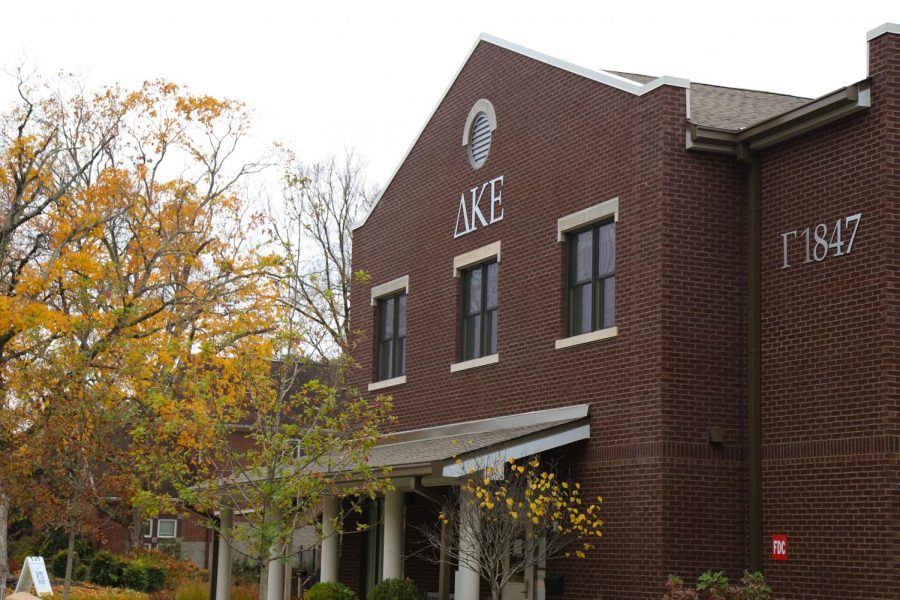Vanderbilt’s Interfraternity Council membership has decreased 37 percent from 854 members in 2015’s fall semester to 528 in 2019’s fall semester, according to the Office of Greek Life’s Semester Academic & Membership Size Rankings. This is the report that Vanderbilt’s Office of Greek Life (OGL) releases every semester regarding the number of members, new recruits and GPAs of the fraternities and sororities in the Interfraternity Council (IFC), National Pan-Hellenic Council (NPHC) and Panhellenic Council.
The number of new IFC recruits for the 2019-20 school year hovers at 291, consistent with the typical number of new recruits of around 280 students over the last four years, a drop from the 2015-16 school year at 398 students.
The most notable reasons for this drop in IFC membership include fewer chapters on campus due to disciplinary reasons, member retention issues within chapters and a changing student demographic, Director of Greek Life Kristin Torrey said.

Data reflects active members during the beginning of the semester before recruitment. Graph created using Canva. (Data is from Office of Greek Life’s Semester Academic & Membership Size Rankings)
In the last five years, Phi Delta Theta, Alpha Epsilon Pi, Sigma Alpha Epsilon, Phi Kappa Psi and Phi Gamma Delta have been suspended by the IFC and their national organizations, which means they aren’t recognized as an official chapter on campus. These five fraternities had an average of 81.6 members in their respective final semesters on campus, according to Torrey. Fraternities have been suspended for disciplinary reasons including hazing, alcohol-related offenses and drug paraphernalia.
Six of the ten IFC fraternities on campus are currently on social suspension, which means they are forbidden from holding official social events but are still active chapters on campus. The fraternities currently not suspended are Lambda Chi Alpha, Pi Kappa Alpha, Delta Tau Delta and Zeta Beta Tau, according to Torrey. At the start of last week, seven of the ten IFC fraternities were on social suspension, as Delta Tau Delta was released from social suspension Feb. 19, according to several Delta Tau Delta members.
IFC President Callen DiGiovanni said he is looking to employ other methods of handling violations, rather than relying on social suspensions.
“The IFC Judicial team can also include other action items, such as an education session, in [a disciplinary] outcome, depending on the circumstances of the case,” DiGiovanni said in an email to The Hustler. “The goal of these sessions is to provide each group with the necessary resources and information they need to minimize the risk of violations occurring in the future.”
Kappa Sigma President Quinn McCarthy said that even though Kappa Sigma is currently suspended, they still maintain a strong relationship with OGL and are working together to fix issues within Greek life.
“I think we’re trying to change or at least push the expectation of what fraternities can do on campus,” McCarthy said.
Another reason for the drop in IFC membership is poor membership retention, according to Torrey. Over the last five years, four fraternities have been discontinued due to a lack of interest.
McCarthy said that within Kappa Sigma, member retention has been high. In the past four years, only two or three active members have left the fraternity, he said, but this year 19 seniors left following the announcement of their social suspension.
Three of the four fraternities that have been discontinued were identity-based fraternities. The IFC currently doesn’t have any identity-based fraternities. Torrey said she believes the reason for their lack of success is due to the size of their chapter and because there were other student organizations that could help fill the need for connection and belonging.
“Managing a small chapter size forced them to make the fraternity central to their leadership identity and how they prioritized their time on campus,” Torrey said in an email to the Hustler. “Given the diverse make-up of the other IFC chapters, they were always competing against other much larger chapters that would not force students into making the fraternity a number one priority or expecting them to be an officer — it was an opportunity, not a requirement in the other IFC chapters.”
Another reason for the drop in membership is changing demographics, according to Torrey. Per the factbook from Vanderbilt’s Office for Planning and Institutional Effectiveness (PIE), around 38.8 percent of Vanderbilt’s 2015 incoming class were racial minorities, compared to 42.1 percent of this year’s incoming class.
One IFC member said that he didn’t think that Vanderbilt’s changing demographics alone were necessarily responsible for the drop in membership; instead, he thinks the growing negative perception of Greek life around the country is the biggest cause.
“When you have kids that are not the typical frat star coming in and all they have is this [expletive] perception, it’s so hard to convince them to come to the other side,” he said.
DiGiovanni said in an email to the Hustler that IFC leadership is looking to address the decline in membership by reforming recruitment and new member education practices to make IFC recruitment more inclusive and promote the health and safety of those who partake.
McCarthy agreed that recruitment was an issue within Greek life. He said that Kappa Sigma is aligned with OGL on fixing problems around recruitment.
“At points, [recruitment has] become this arms race of who can have the best class, and who can have more events,” McCarthy said.
The recent decline in IFC membership may be reversed by the fraternities coming back to campus in the next five years. Beta Theta Pi will be returning to campus Fall 2020, and at least seven other fraternities are scheduled and eligible to return to Vanderbilt within the next five years, per Torrey.

Beta Theta Pi is scheduled for Fall 2020, Phi Delta Theta, Alpha Epsilon Pi is scheduled for Spring 2021, Phi Kappa Psi is scheduled for Spring 2022, Sigma Alpha Epsilon is scheduled for Spring 2023, Phi Gamma Delta is scheduled for Fall 2023 and Theta Chi is scheduled for Fall 2024. Note: These are times that the fraternities are scheduled/eligible, but they could choose not to return at this time. Beta Theta Pi is confirmed to be returning this Fall. Graphic created using Canva. (Information from Director of Greek Life Kristin Torrey)
“I think this type of experience—one that will mix the natural community engagement and sense of belong[ing] that fraternity provides coupled with the entrepreneurial spirit and creativity that founding a new organization provides, will be attractive to students,” Torrey said.
Correction: A previous version of this article included information from Director of Greek Life Kristin Torrey during an interview Friday, Feb. 21, that stated seven of ten IFC chapters are on social suspension. After this article was posted, Torrey informed The Hustler that Zeta Beta Tau is not currently on social suspension, which means that six of ten IFC chapters are currently on social suspension.













Doug Wilson • Feb 24, 2020 at 1:39 pm CST
As a proud member of the Class of 1977, and of the Kappa Sigma fraternity, I was initially saddened by your headline. My memories of Greek life in the mid 70’s were every bit a part of my “Vanderbilt experience” as any class, lecture, professor, or university event that I attended. But as I gave the matter more thought I realized that I should not be depressed about this at all, and frankly should have expected it. In the social climate of 2020, organizations like fraternities are out of vogue. The practice of asking one person to join something while deliberately shunning another would surely offend the sensibilities of a student body (and administration) where today even personal pronouns are considered vulgarisms. I am so very glad that I attended this fabulous university when I did, and not today. As incredible as it may sound to today’s students we had on-campus keg parties, live bands, mixers, rush events, and all the other trappings of college life in those days. In spite of these frivolous pursuits most all of us went on to be valuable members of society, great parents, and loyal members of our local congregations…………we just had a lot more fun in the process.
Kimberly Klauber • Feb 24, 2020 at 12:03 pm CST
Social suspensions make the fraternities even more exclusive because they take their parties off campus. At least on campus they are somewhat inclusive.